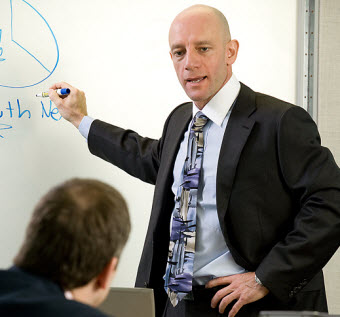The impact has sometimes been all the greater because these tips are not
known in my area.
Things to Avoid:
Avoid side-issues which do not relate to the topics.
Avoid negativity, especially about:
Individuals
Other people’s ideas
Other people’s performance
Do you talk too long or too often?
Do you tend to leave it to the “experts” in the group? If the point being
discussed will affect you, your colleagues or customers, then you should
make sure that the effects and, especially, any possible negative
Copyright © 2009 All Rights Reserved
- 25 -


“How to Make Meetings More Productive” by Pete Harmon
Page 26 of 52
consequences are known to all concerned with the decision and its
implementation.
Some people don’t put their point of view about the items discussed and then
criticize the decisions which are made.
Don’t switch off when someone
is replying to a point you made
while you focus entirely on
preparing your next comment.
If you didn’t understand what
someone said, ask them to
repeat it or perhaps explain it
more simply. Very few people could be offended by someone showing
genuine interest and a desire to learn more about their suggestion.
Improving Your Presentation
Not many of us want to be a public
speaker but the ability to present
ourselves to good effect is worth
learning.
The cost and effort of learning these skills
is minimal, but they can give you more
self-confidence and help you with
interviews, business meetings and social
events.
I’ve listed some organizations in the resources section at the end of this
ebook.
You can also do some self-study though you will find you improve faster
when you are in an active and supportive group environment.
One of the best tips I learned for speaking to groups is to never read to
them. You should keep your comments brief so they are easy to remember.
Copyright © 2009 All Rights Reserved
- 26 -


“How to Make Meetings More Productive” by Pete Harmon
Page 27 of 52
Just write them on a card and then glance over the card just before you rise
to speak.
Record Yourself
If you have access to an audio recorder or digital camera, I suggest that you
ask someone to record you.
The first time I heard my own voice after recording
it was a shock. My belief is that we hear our
speaking voice through a sort of sound chamber
(our head).
That can be quite different to how other people
hear us.
After that, I wanted to improve my voice as
quickly as I could.
But, maybe your voice is fine.
So, how do you look on video?
You must realize that you won’t look quite the
same on video as you do really but it will probably be much closer to the
image which other people see and react to than the image we carry in our
own minds.
Now, you smooth out those ums and
ahs
which we are probably almost
completely unaware that we are
doing. That's better for us and
those who are listening to us too.
Is it worth doing? I say, “Yes”.
It’s more effective than a lot of
cosmetic surgery because it’s still
the
real you, and costs you nothing.
And, you can do it whenever you
have some time in your own home!
Copyright © 2009 All Rights Reserved
- 27 -
“How to Make Meetings More Productive” by Pete Harmon
Page 28 of 52
But, even more important than the effect on ourselves is the effect on other
people that we interact with. I’m not suggesting that you adopt any fake
mannerisms or postures. I believe video and even audio can be a great help
for making our message clearer and easier for other people to understand.
Put that with the extra confidence that we can obtain and the small cost of
the equipment is probably a worthwhile investment for just about anyone.
You can also use it to record your kids and your pets and still probably claim it as a business deduction!
I don’t know a better way of catching any mannerisms or muddled speech
that we are no longer aware that we are doing.
Please don’t record over that first attempt too quickly.
Keep the video until you’ve done some practicing. Then, run the original
video and see if you can see any improvement.
That will probably give you more confidence.
Use the equipment you have available to record what you plan to say at your
next meeting.
If you see something which you think should be corrected, you will probably
decide to try a couple of tweaks, nothing major.
That’s the best way, a little at a time. Trying to do too much at once will
probably cause the result to be less effective than if you take it more slowly.
Copyright © 2009 All Rights Reserved
- 28 -

“How to Make Meetings More Productive” by Pete Harmon
Page 29 of 52
Body Language
You have probably heard about Body
Language, the study of visual signals
which we send and receive and how
they affect our interaction with other
people.
Although it is far from an exact
science, it can be helpful in
evaluating what people are telling
you.
There are many factors which can
affect body language which may have nothing to do with their truthfulness or
intent. For example, you will read in most texts about body language that
you should interpret someone folding their arms when you are talking to
them as a sign of them losing interest or confidence in what you are saying.
That may be right, but they may just be cold.
So, you should not just evaluate the message which you get from someone
on their body language alone.
It’s also worthwhile to check that the visual signals which you are displaying match with the message that you want to give the people you are speaking
to.
Many people develop mannerisms which detract from the effectiveness of
what they say. Correcting these will improve the results you get in most
situations.
But, changing your natural body language or other acquired traits is not
something that you can do overnight. It takes time.
Don’t try to make more than one change at a time.
These techniques are often used to try to deceive people but most people
cannot project false signals consistently. The people they try to bluff are
often put off by the lack mixed signals they get.
Copyright © 2009 All Rights Reserved
- 29 -

“How to Make Meetings More Productive” by Pete Harmon
Page 30 of 52
Eye Contact: This is one of the most important factors in any kind of social or business interaction.
Many people have difficulty maintaining eye contact. It only takes a little
effort and you will probably notice a better response from the people you
deal with fairly quickly.
You just have to focus more on the person you are listening to. Our society
offers many distractions and we may let our attention wander from their face
to their clothes or something else completely.
One simple tactic which can help you to focus on what they are saying and
also to demonstrate that you are interested in what they say is to use what
they say as the basis of your reply. Developing this habit will make you focus more on their words and gestures instead of just focusing on your own
thoughts while they are speaking.
Eye contact can, like many other techniques, be overdone especially when
you are trying to improve your use of it. No-one wants to be stared at.
Smile: A genuine smile is like a magnet that can draw people toward you.
Check your smile in a mirror to ensure that it does not look forced or
insincere.
Posture: Our posture may be giving a different message to what we are
saying.
Some people want cooperation but show an aggressive stance, by leaning
forward or clenching their hands, which indicates they want control.
Some people adopt a defensive or submissive posture, with a bowed head or
slumped shoulders, which detracts from their message by suggesting that
they perhaps lack confidence in their ability to present their point of view or what they are saying.
Gestures: Thoughtful use of appropriate gestures can re-enforce your points and help people to remember them better.
Some people use irrelevant or inappropriate
gestures, or they fiddle with their glasses,
Copyright © 2009 All Rights Reserved
- 30 -
“How to Make Meetings More Productive” by Pete Harmon
Page 31 of 52
pen or other items while they talk. This distracts the people they are talking to from their message.
This can be reduced or eliminated by putting more effort into your
preparation so that you can focus on the people you are talking to.
Inexperienced speakers tell me that they don’t know what to do with their
hands.
The problem is usually that they may not know their material well enough or
they lack confidence in their ability to put their points forward, so their mind focuses on other aspects of their presentation like their hands.
Copyright © 2009 All Rights Reserved
- 31 -

“How to Make Meetings More Productive” by Pete Harmon
Page 32 of 52
Problems and Remedies
Disruptions
Mobile Phones, etc: There is always the possibility of a true emergency requiring the attention of someone in the group during the meeting.
But, except for those rare occurrences, everyone present owes it to the rest
of the group to remain focused on the matters being discussed.
Unless there is a good reason for people to use their lap-tops during the
meetings for the benefit of the group, ask them to keep them shut.
Likewise, all mobile phones and other portable communication devices should
be silent and, preferably, turned off for the duration. That is the ideal but
you’ll probably have to deal with that sort of interruption from time to time.
I’ve found that circulating a notice with the agenda, asking all those who
attend to leave their devices with a trusted associate or switch them off while they are in the meeting is often the most you can do unless you own the
business.
Inattention: Sometimes you will
notice that someone is absorbed in
using their device and not taking any
active part in the meeting. You might
want to ask them their opinion about
the topic being discussed. After all,
there’s no reason for them to be there
if they are not ready to contribute to the discussion.
Interrupting other speakers: This has to be firmly but politely
discouraged, unless the interruption is to correct an error.
Food: If the meeting is only for an hour or so, there should be no need for refreshments other than water. The lack of coffee and other drinks may
encourage people to keep the meeting short and their comments on topic!
Background conversation: This is likely to be on a totally different topic to what the group is trying to focus on, so it is likely to cause irritation as well Copyright © 2009 All Rights Reserved
- 32 -
“How to Make Meetings More Productive” by Pete Harmon
Page 33 of 52
as making it hard for the other people to hear the person who is presenting
their suggestion or comment on the topic.
Ask the speaker to pause for a moment and ask one of the conversationalists
to share their idea with the group.
It’s a tactic straight from the junior school but it works. And, these people
are not acting like adults, are they?
Faulty Equipment: Have a contingency plan, but ensure that all
presentation materials from projectors to marking pens are checked
immediately before the meeting.
Responding to Comments
Negative comments: Some people delight in talking down other people’s
contributions. They’re often too busy working out something to say that they
don’t have time to contribute much that’s positive to the discussion. So, you
might ask them directly, “How would you deal with this
situation/problem/need?”
Off-topic comments: These are unproductive and time wasting. Thank the
person for their contribution and perhaps add something like, “Do you have
any suggestions about the topic?”
Repetitive comment: When someone meanders on with their suggestion
without adding any further useful material, thank them for their contribution.
Then focus on another speaker. Be polite but firm, so that you can keep the
meeting within a reasonable time frame.
Revisiting previous topics: If someone tries to bring up a topic which has already been discussed, politely remind them of the earlier discussion but
also suggest that they raise the matter in the “further business” section near the end of the meeting if they have new points which they want to put to the
group.
Confusing contribution: Sometimes, someone offers a suggestion but is
not able to express it clearly. The Chair should offer what they understand to Copyright © 2009 All Rights Reserved
- 33 -
“How to Make Meetings More Productive” by Pete Harmon
Page 34 of 52
be the suggestion. That should help the person gather their thoughts and
express their view more clearly.
Being helpful in that way will encourage the person to contribute more in the
future and probably get their enthusiastic support for implementing any
decisions made by the group.
Copyright © 2009 All Rights Reserved
- 34 -
“How to Make Meetings More Productive” by Pete Harmon
Page 35 of 52
Asking Questions the Right Way
Asking questions is one of those things we do almost every day, so most of
us take it for granted that we do it well.
But, many people don't get the answers they need.
Improving the quality of our questions will get better results and make the
people we ask or advice and information more responsive.
Open and Closed Questions
You probably know the difference between open and closed questions;
a closed question only needs a short, specific answer such as yes or no.
An open question gives the person you are asking an opportunity to provide
a detailed answer which can lead to more information being provided and
further discussion.
Each type of question is most likely to be much more helpful to you in some
circumstances:
Use closed questions to:
Keep answers from garrulous people short and on topic
Get confirmation of specific points without possibly confusing detail or
side issues such as opinions and theories.
Closed questions tend to end any discussion of that particular point because
they do not encourage the other person to say anything which will invite
further responses from you or other people in the group.
Use open questions to:
Encourage people to participate in the discussion and add any relevant
material which they have
Broaden the discussion of the topic to ensure all that all important
points are covered
Bring more people into the discussion
Copyright © 2009 All Rights Reserved
- 35 -
“How to Make Meetings More Productive” by Pete Harmon
Page 36 of 52
Pointed Questions
Pointed or leading questions are stock in trade for lawyers.
They can be helpful but you need to be careful when using them.
Some ways to use pointed questions include:
a) Assume that your preferred answer is what the other person will say.
"Will we order the green trolleys?" is more likely to get a decision and avoid prolonged discussion than, "which trolleys will we order?"
b) Add a question to a statement of your opinion. This might be
something like, "The Roosters are a great team, don't you think?"
When used carefully, pointed questions can help you to control the discussion
and increase the possibility of getting the results you want. They also can
reduce the length of time taken to reach a conclusion on that particular point.
Follow-up questions
Be ready to ask for more specific details about any answer you get.
When someone answers your first question, they may mention something
which suggests that they have further relevant information.
There may be times when you use follow-up questions to try to get
information which the other person seems unwilling to provide.
Always be considerate of the other person and keep a professional attitude.
Where appropriate, compliment them on the work they have done and their
clear explanations.
Put your questions on the basis that you, or other people who are involved,
do not have that person’s deep knowledge of the particular subject and you
would appreciate more detail so everyone is able to understand the whole
discussion.
Best and Worst Questions
The worst questions are those which are focused on getting some benefit for
us and don’t offer anything to the person we are asking.
Copyright © 2009 All Rights Reserved
- 36 -
“How to Make Meetings More Productive” by Pete Harmon
Page 37 of 52
The best questions are those which are focused on getting some benefit for
us but also offer something to the person we are asking.
A lot of large fortunes were based on the idea of providing services to other
people.
All of us are tuned to Radio Station WIIFM, “What’s In It For ME” so we are
likely to react a lot better when someone is showing interest in supplying
what we want, even when they want us to pay something for that.
Copyright © 2009 All Rights Reserved
- 37 -
“How to Make Meetings More Productive” by Pete Harmon
Page 38 of 52
Better Listening
Practicing good questions will be of little value unless you also listen carefully to the answers and respond appropriately.
Hearing, like talking, is something that most of us can do well enough to get
by from an early age.
Listening is something we think we’re naturally good at too. But, hearing is an ability we are given, listening is something we have to learn to do well.
The effort is worth it because people really appreciate someone that makes
better communication easier for them.
Try these tips to improve your listening and you could improve your social
and business success as well.
9 Maintain eye contact with the speaker. Don’t look over their shoulder at someone else.
9 Don’t focus on what you’re going to say next. If you seem
disinterested, they may not stay around to find out what that is.
9 Don’t interrupt (your grandmother was right about that!)
9 Show interest by leaning slightly toward the speaker.
9 Give visual feedback; a slight nod or a genuine smile.
If your smiles are not getting good responses, check them in the mirror –
many professional performers put as much effort into practicing their smiles
as they do their scripts.
Some factors which may reduce your ability to listen well include:
Your own preconceptions about the speaker or the topic.
Your state of health
Noise
Weather conditions
Low attention focus
Copyright © 2009 All Rights Reserved
- 38 -
“How to Make Meetings More Productive” by Pete Harmon
Page 39 of 52
The most important trait is to be yourself and don’t just assume a posture to
try to impress someone or a group.
Copyright © 2009 All Rights Reserved
- 39 -

“How to Make Meetings More Productive” by Pete Harmon
Page 40 of 52
Meetings Out Of Your Office
Everyone likes to get away from the office or workshop routine sometimes. If
you can’t get a holiday, the next best thing might be a couple of hours at a
local restaurant or a few days at a hotel in another city or even another
country.
The first thing to remember about these trips, whether across a road or an
ocean, is that you’re still representing your company the whole time you are
with your colleagues.
Networking events, Seminars, Power
lunches; they’re all business events and
you’re likely to be seen as either
promoting your brand or downgrading it.
Most of these events are focused on
business but they’re no place for a hard-
sell.
Practice an elevator-style introduction for
yourself and what you do; that’s about thirty-five to fifty words which are
interesting to the person listening even if they’ve never heard of an agrarian consultant before. The elevator refers to the original concept that you
prepare an introduction which you could tell someone (only after they asked)
who you are and what you do while you were both in a fast elevator between
floors.
If you are at a











